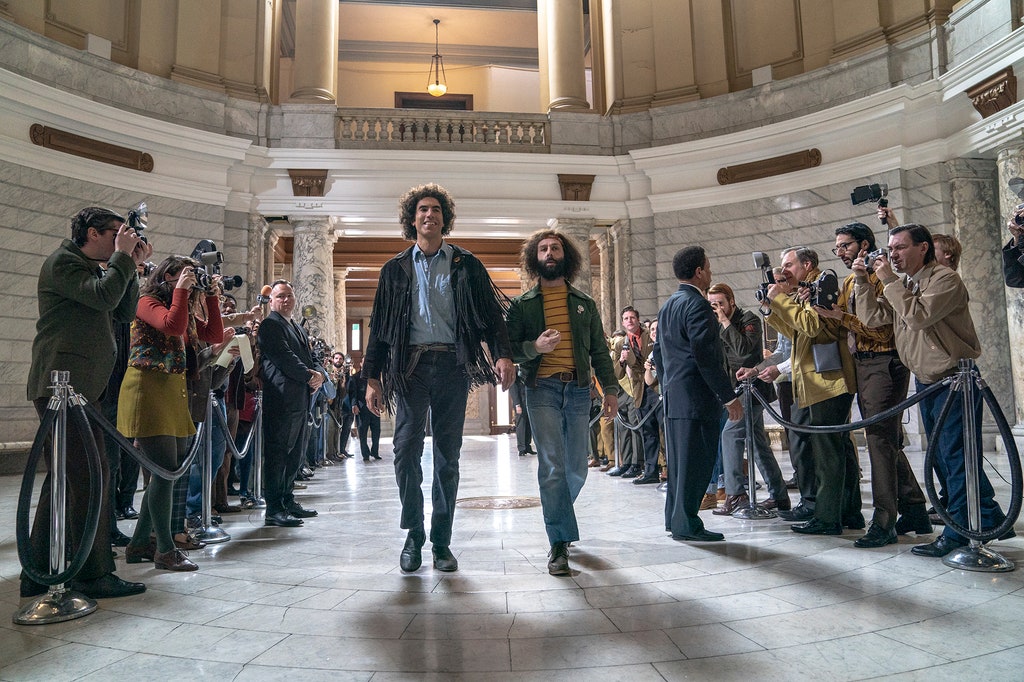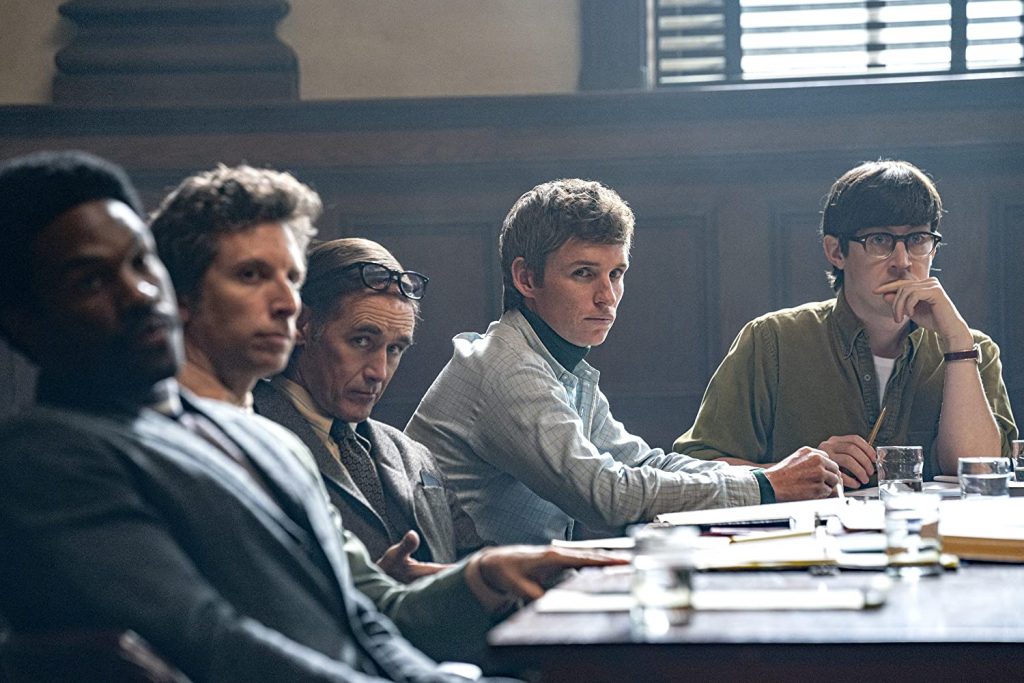Joe’s Take
Aaron Sorkin is my favorite screenwriter, but he is far from my favorite director. That’s not to say he’s bad at it. His directorial debut came with 2017’s “Molly’s Game.” The first time I saw “Molly’s Game” I liked it, but I didn’t love it. Its strengths? Sorkin’s writing and the acting. The weakness? Sorkin’s directing. The transitions from past to present in “Molly’s Game” didn’t flow well. It felt as though a new movie was starting every time the movie juggled time periods. That’s how I felt in 2017.
After numerous watches, I now love “Molly’s Game.” Mostly I adore the writing and acting, especially in scenes where Jessica Chastain and Idris Elba share the screen. The directing still doesn’t elevate the film, but I was a little too harsh in my first go-around.
I hold Sorkin to an extremely high standard when it comes to his writing, because he always delivers. “A Few Good Men” and “The Social Network” are two of my favorite movies and “The West Wing” is one of my favorite TV shows. What makes me shy away from Sorkin directing his own films is that he usually teams with amazing directors, such as David Fincher (“The Social Network”), Rob Reiner (“A Few Good Men” and “The American President”), Bennett Miller (“Moneyball”), Mike Nichols (“Charlie Wilson’s War”) and Danny Boyle (“Steve Jobs”). These great directors get the most out of Sorkin’s scripts. Fincher helped boost “The Social Network” script all the way to an Oscar. Despite that, writing AND directing seems to be Sorkin’s present focus.
Enter “The Trial of the Chicago 7.”
Sorkin returns to the courtroom for a story based on true events. The Netflix film is his second time pulling double duty as the writer and director. When it comes to directing, Sorkin is a quick learner. Sorkin kept the pace fluid, which matched his usual rapid dialogue. He cuts from the present to the past, but he often interweaves the scenes so the film doesn’t come to a halt like in “Molly’s Game.” He also incorporates real footage nicely. The only problem I have is a choice near the end of the film. The movie fades to black in the middle of a scene and then jumps to the end of the film. I didn’t understand the purpose of that. It felt so disjointed and very unlike Sorkin. I expect a cross examination to build toward, “You can’t handle the truth!” not cut off in the middle.
Other than that, Sorkin really stepped it up in the director’s chair. From there, it’s smooth sailing. Sorkin’s script is again incredible and the ensemble cast is awesome. His ability to create a verbal action sequence is on full display again. He’s also able to perfectly balance humor and entertainment with the seriousness of the plot. This is no surprise, but he needs the actors who are up to the challenge. They were.
This cast is deep. Eddie Redmayne (Tom Hayden) usually takes on a flashy role, unless he’s in a “Fantastic Beasts” movie. He’s excellent in 2014’s “The Theory of Everything” and “The Danish Girl,” but it was nice to see him in more of a contained role in the “The Trial of the Chicago 7.” The film is a true ensemble and he nails his role.
The standouts are Sacha Baron Cohen (Abbie Hoffman) and Yahya Abdul-Mateen II (Bobby Seale). Cohen had the flashiest role where he really had to show his range, which he has. He could turn on the comedic timing and shut it down for some dramatic sequences. While this movie has no one star, Cohen separates himself and may receive some Oscar attention, assuming there is an Academy Awards in April.
I don’t know Abdul-Mateen from much, but he got on my radar and everybody else’s for his Emmy winning performance in HBO’s “Watchmen.” He took it up another level in “The Trial of the Chicago 7.” Abdul-Mateen has a tough role as Seale. His verbal scenes are great, but his physical sequences and presence he brings to the film are just as important. Phenomenal job.
Every actor has his moment so I’ll do my best Sorkin impression and try to make this quick. (Inhales) Mark Rylance (William Kunstler) is great in everything and this film just builds on his outstanding legacy, Jeremy Strong (Jerry Rubin) may be underrated at this point as he has played strong roles in Oscar quality movies, John Carroll Lynch (David Dellinger) can do it all, Joseph Gordon-Levitt (Richard Schultz) does a beautiful job balancing his beliefs and his duty without having to speak in order for the audience to know his feelings and Frank Langella (Judge Julius Hoffman) is incredible at playing a hateable character (exhales).
There’s also a surprise cameo that’s pretty great.
I’m confident Sorkin can make anything sound interesting, but the story is engaging and very timely. I knew nothing about the Chicago 7 so I was on the edge of my couch watching the film. It takes you through a lot of emotions in about two hours. It’ll make you laugh and tear up. It’ll also shock you.
This is such a hard score for me to give out, because I thoroughly enjoyed this film. The writing and acting are phenomenal and Sorkin’s directing is improved. I’ll watch it many more times. It absolutely deserves a high score so that’s what it will get. However, take into account that I adore Sorkin’s work and “The Trial of the Chicago 7” is not among the best. It’s no “A Few Good Men.” It’s no “The Social Network.” It’s no “Moneyball.” It’s no “The West Wing.” It’s no “Molly’s Game.” However, his work gets better upon repeat viewings so who knows where it will stand in my eyes years from now.
And I won’t let Sorkin’s amazing work of the past take away from this film’s greatness.
4.5 out of 5 stars

Sacha Baron Cohen, left, and Jeremy Strong in “The Trial of the Chicago 7.”
Rebecca’s Take
To say we live in turbulent times is an understatement. Our country faces a polarizing presidential election against the backdrop of a raging pandemic and a national reckoning over racial injustice. In 1968, our country also faced a defining presidential election amid an unpopular war and the fight for civil rights.
The powerful “The Trial of the Chicago 7” speaks to us now, looking at our nation’s present through the lens of the past. Based on historical events, the gripping Netflix drama about the aftermath of the violent riots at the 1968 Democratic National Convention is one of the most important films of the year, stirring disbelief and outrage.
Much like this summer’s “Da 5 Bloods,” “The Trial of the Chicago 7” comes out at a relevant time, even covering some of the same ground. While “Da 5 Bloods” traveled to the battlefield of the Vietnam War, “The Trial of the Chicago 7” mostly sticks to the courtroom, delving into the stateside reaction to the divisive conflict from the point of view of anti-war protesters.
The film chronicles the trial of the seven men accused of inciting the Chicago uprising that injured hundreds. The defendants include anti-Vietnam war activists Tom Hayden (Eddie Redmayne) and Rennie Davis (Alex Sharp) and counterculture icons Abbie Hoffman (Sacha Baron Cohen) and Jerry Rubin (Jeremy Strong). Representing the men are attorneys William Kunstler (Mark Rylance) and Leonard Weinglass (Ben Shenkman), who must mediate the dissention between their clients, face off against determined prosecutor Richard Schultz (Joseph Gordon-Levitt) and challenge the questionable rulings of combative Judge Julius Hoffman (Frank Langella).
“The Trial of the Chicago 7” looks at citizens’ right to protest and how such protests can escalate into violence, recalling recent demonstrations in the Black Lives Matter movement. As the trial goes on, the film points out the defendants aren’t the only ones under scrutiny; so are the police and the federal government. As history repeats itself, “The Trial of the Chicago 7” highlights the parallels, holding a mirror between the past and present.
The story also reaches out into the modern day in an eerie way. The most dramatic scene concerns Bobby Seale (Yahya Abdul-Mateen II), the Black Panthers leader who was initially included as the eighth defendant in the trial. Throughout the film, Seale – the only Black defendant – is repeatedly subject to dehumanizing treatment from the judge. The upsetting resolution will remind viewers of George Floyd, whose death at the hands of police has galvanized protests across the country.
In his second time in the directing chair, writer/director Aaron Sorkin skillfully weaves thrilling courtroom theatrics with rousing flashbacks. The smart, insightful script showcases “The West Wing” scribe’s mastery of verbal gymnastics. The dialogue-heavy film often shows characters talking, whether through courtroom exchanges, office meetings or protest planning sessions. These scenes can be hard to make interesting, but not under Sorkin’s hand. The conversational jousting between characters makes them sing.
Sorkin has also grown as a director. In his strong directorial debut “Molly’s Game” (2017), he showed a flair for the camera but struggled to integrate flashbacks explaining the main character’s backstory. In “The Trial of the Chicago 7,” Sorkin finds the right balance, seamlessly blending in flashbacks of the riots and the events leading up to them among the trial arguments. The heated exchanges in the courtroom are amplified by the cuts to the jaw-dropping action from the protests, provoking viewers’ emotions.
The excellent performances of its star-studded ensemble cast bring “The Trial of the Chicago 7” to life. As the film’s standout, Cohen deftly juggles comedy and drama as the sarcastic Hoffman. The “Borat” actor knows when to turn up the laughs, but also when to tone it down and lean into the seriousness of a scene. The actor deserves Oscar consideration for his performance. Known for his breakout role in HBO’s “Watchmen,” Abdul-Mateen capably carries the weight of the film’s most emotional scenes, making the most of his short screen time. Strong also delivers as the likable and sensitive Rubin.
Did I mention there’s two Oscar winners in the cast? Redmayne shines as the cool and calm Hayden, gradually peeling away the activist’s vulnerabilities. And the fantastic Rylance alternates between collected and outraged, reaching his limits with Langella’s possibly incompetent judge. On the government’s side, Gordon-Levitt is great as the down-to-earth prosecutor trying to do his job. And there’s a cameo performance that will knock your socks off.
In today’s current times, “Da 5 Bloods” and “The Trial of the Chicago 7” make a fitting double feature, connecting two contentious eras. Both use the context of the Vietnam War as a magnifying glass to view society. Also like “Da 5 Bloods,” the introspective drama is one of the best films of the year. With its pressing social commentary, sharp script and outstanding performances, “The Trial of the Chicago 7” asks viewers to become jurors themselves by taking the lessons of the past and applying them to our present.
4.5 out of 5 stars

Rebecca Kivak and Joe Baress write about movies for Take 2 blog. Together, they review current flicks and offer their insights into the latest movie news. Rebecca is a copy editor and page designer at The Times-Tribune. She started her career with Times-Shamrock Newspapers in 2005 and has won several professional journalism awards for page design and headline writing. She also covers NASCAR races from Pocono Raceway. Contact: rkivak@timesshamrock.com; 570-348-9100 x5126; @TTRebeccaKivak



